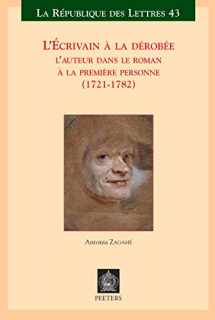
L'Ecrivain a la Derobee: L'Auteur Dans Le Roman a la Premiere Personne (1721-1782) (La Republique Des Lettres) (French Edition)
ISBN-13:
9789042923522
ISBN-10:
9042923520
Edition:
0
Author:
A Zagame
Publication date:
2011
Publisher:
Peeters
Format:
Paperback
412 pages
FREE US shipping
Book details
ISBN-13:
9789042923522
ISBN-10:
9042923520
Edition:
0
Author:
A Zagame
Publication date:
2011
Publisher:
Peeters
Format:
Paperback
412 pages
Summary
L'Ecrivain a la Derobee: L'Auteur Dans Le Roman a la Premiere Personne (1721-1782) (La Republique Des Lettres) (French Edition) (ISBN-13: 9789042923522 and ISBN-10: 9042923520), written by authors
A Zagame, was published by Peeters in 2011.
With an overall rating of 3.6 stars, it's a notable title among other
books. You can easily purchase or rent L'Ecrivain a la Derobee: L'Auteur Dans Le Roman a la Premiere Personne (1721-1782) (La Republique Des Lettres) (French Edition) (Paperback) from BooksRun,
along with many other new and used
books
and textbooks.
And, if you're looking to sell your copy, our current buyback offer is $0.3.
Description
English summary: While the writer in the eighteenth century becomes the repositor of expertise in the field of morality and knowledge of the passions, the novel in first person narrative, the most common of the time, seems to do everything to conceal his presence. By entrusting the narration of history to those who lived it, epistolary novels and memoirs allow the author to disappear behind his characters. The discovery and study of contemporary accounts unexplored by critics reveals that in the eighteenth century, through the writing and interpretation of fiction, more than in theory, one can apprehend the basic questions of hermeneutics and poetic romance. By what means can the author manifest himself in a novel? The study of narrative forms of the Enlightenment that allow the absence of the author and the modalities of interpretation, as well as of reading practices that accompany them, allow us to consider these issues from a historical perspective. French text. French description: Alors que l'ecrivain devient au XVIIIe siecle le depositaire d'une competence dans le domaine de la moralite et de la connaissance des passions, le roman a la premiere personne, forme narrative alors la plus repandue, semble tout faire pour dissimuler sa presence. En confiant la narration de l'histoire a ceux qui l'ont vecue, romans-memoires et epistolaires permettent a l'auteur de disparaitre derriere ses personnages. Antonia Zagame montre comment l'ecrivain fait pourtant entendre sa voix dans ces textes dont il est absent comme instance de discours. En analysant la lecture que sollicitent ces romans mais aussi leur reception effective, elle releve les traces d'une presence qui ne se manifeste qu'indirectement a travers la preface, le recit, le style. La mise au jour et l'etude de temoignages de lecture contemporains peu explores par la critique permet de constater qu'au XVIIIe siecle, c'est a travers l'ecriture de la fiction et ses prolongements interpretatifs, plus que dans la theorie, qu'ont ete apprehendees des questions essentielles de poetique et d'hermeneutique romanesque. Par quels biais se manifeste l'auteur dans un roman ? Comment remonter des personnages a l'auteur ? Sur quels indices se fonde le lecteur a cette fin ? Les questions qui ont interesse auteurs, lecteurs et critiques a une epoque ou le roman devenait le genre litteraire dominant et ou l'ecrivain de fiction se voyait investi d'une responsabilite nouvelle rejoignent les interrogations des theoriciens d'aujourd'hui sur l'autorite enonciative ou la construction des valeurs textuelles dans un recit de fiction. L'etude des formes narratives des Lumieres qui permettent l'absence de l'auteur et celle des modalites d'interpretation, des pratiques de lecture qui les accompagnent, permettent d'envisager ces questions depuis un point de vue historique.


We would LOVE it if you could help us and other readers by reviewing the book
Book review

Congratulations! We have received your book review.
{user}
{createdAt}
by {truncated_author}


